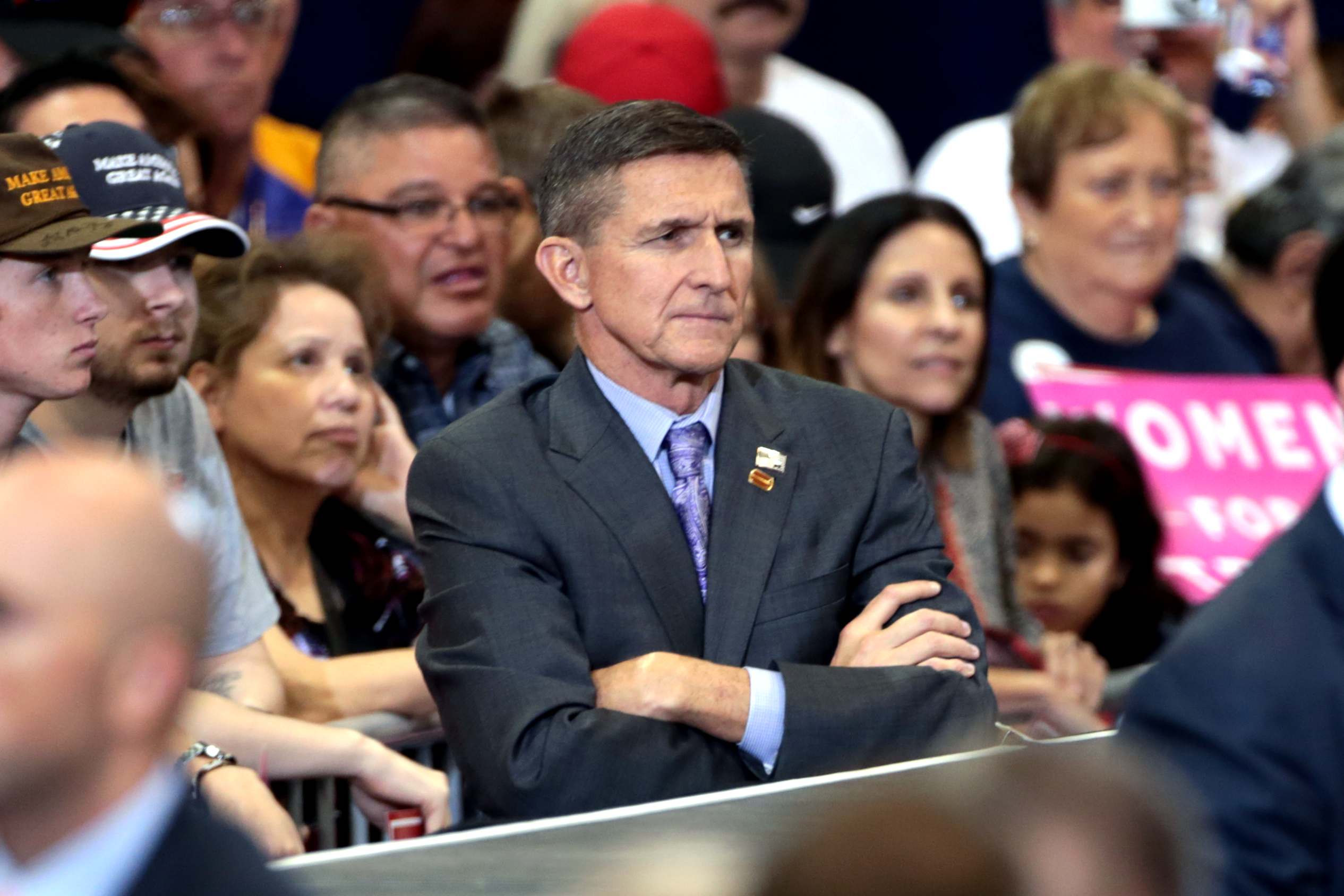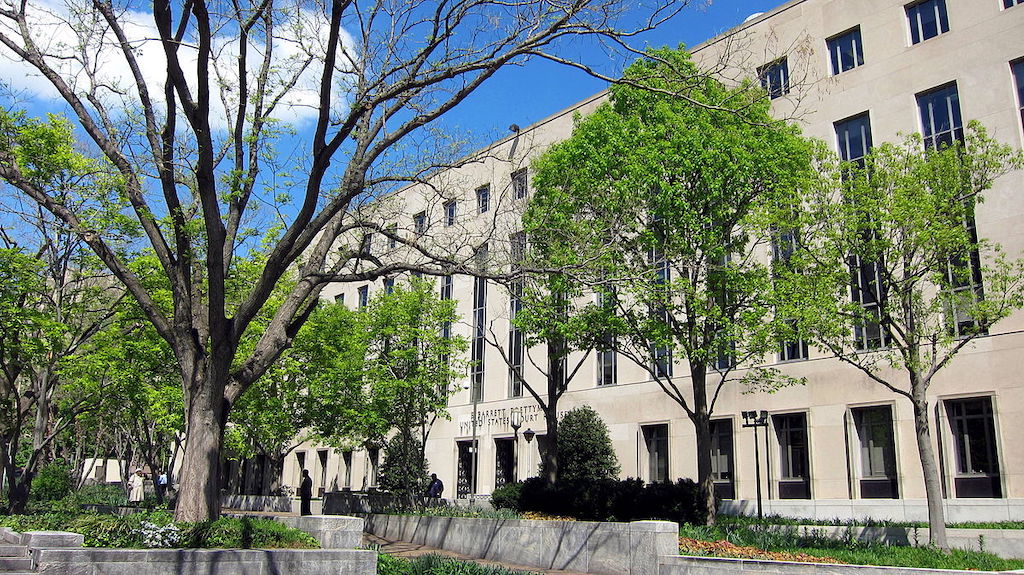Flynn Must Fly to Fulton
Judge rules that, much like Newt Gingrich and Lindsey Graham, Michael Flynn cannot ignore a Fulton County grand jury subpoena.

Published by The Lawfare Institute
in Cooperation With

Editor’s note: The following is a dispatch from Nov. 15, the latest episode in our series on the Fulton County criminal probe into interference in Georgia’s 2020 presidential elections.
Following a quiet period during the run-up to the 2022 midterm elections, it’s been a particularly busy two weeks in the Fulton County criminal probe.
Last week, a Virginia judge ordered Newt Gingrich, the former speaker of the House, to testify before the Atlanta-area grand jury investigating 2020 election interference. Earlier today, the grand jury heard from Georgia Gov. Brian Kemp, who reportedly testified for roughly three hours. And, later this week, the grand jury is set to hear from a spate of high-profile witnesses, including Meadows’s former aide and confidante, Cassidy Hutchinson, and Sen. Lindsey Graham (R-S.C.). (Graham’s testimony was later rescheduled.)
Now, in a courtroom in Sarasota County, Florida, former National Security Adviser Michael Flynn is set to argue that he should be allowed to ignore a subpoena to testify before the Fulton County grand jury.
Sorry to disappoint Lawfare readers, but today’s hearing did not start with an awkward elevator run-in between me and Flynn or his attorneys. Why? Because the hearing is on Zoom.
As with Jenna Ellis’s witness hearing in Colorado over the summer, the multistate nature of the matter requires a “hybrid” hearing: The Florida folks, including Flynn, appear in-person at the Sarasota County Justice Center, while the rest of us join virtually via Zoom.
As you might remember from Newt Gingrich’s similar out-of-state witness hearing last week, or Meadows’s hearing last month, the matter is being litigated in Florida because that’s where Flynn lives. While a state’s authority to subpoena a witness generally ends at its borders, every state has adopted some variation of the Uniform Act to Secure the Attendance of Witnesses From Without a State in Criminal Proceedings, which sets out a procedure to compel the testimony of out-of-state witnesses.
Under the applicable Florida law, Fla. Stat. §§ 942.01-06, a witness located in Florida can be compelled to testify before an out-of-state grand jury if a local judge issues a summons directing him or her to appear. The statutory provisions require the judge to find that the witness is both “material” and “necessary” to the out-of-state grand jury’s investigation, and that a summons to appear out of state will not cause “undue hardship” on the witness.
Appearing in person on behalf of Flynn is Jason Greaves of Binnall Law Group. Meanwhile, in a small box on the right-hand side of my Zoom court screen, I spot a familiar face: Will Wooten, the Georgia prosecutor charged with handling out-of-state witness matters. On behalf of the Fulton County district attorney’s office, Wooten will argue that Judge Charles Roberts should issue a summons to compel Flynn to travel to Georgia for his appearance before the special purpose grand jury.
Around 3:06 p.m., Roberts kicks off the hearing. After resolving a set of preliminary issues related to the parties’ filings, he invites Greaves to make an argument on behalf of Flynn.
Greaves begins by setting out two reasons why Flynn should not be forced to testify. First, he argues, Flynn cannot be compelled to appear in Georgia under the procedure set out in the Uniform Act, because the act does not apply to the unique type of grand jury impaneled in Fulton County: a “special purpose” grand jury. What’s more, he contends, Fulton County prosecutors have failed to prove that Flynn is a “necessary” and “material” witness to the Fulton grand jury’s investigation.
Expounding on the first argument, Greaves details why the Fulton County special purpose grand jury is not the kind of grand jury contemplated by Florida’s Uniform Act. He contends that the Uniform Act applies only to “traditional” criminal grand juries. The Fulton County special purpose grand jury, he says, is not a criminal body, but an “inquisitorial” body.
Continuing with this line of argument, Greaves notes that, unlike a traditional grand jury, Georgia’s special purpose grand juries cannot issue indictments; they can only recommend them. Moreover, he claims, special purpose grand juries cannot grant immunity for compelled testimony. And he cites Georgia Court of Appeals precedent, Kenerly v. State, which appeared to suggest that special purpose grand juries in Georgia are merely “civil” investigations under state law.
Greaves pivots briefly to his second argument: that Flynn is not a “material” and “necessary” witness. He acknowledges that the special purpose grand jury’s supervising judge, Robert McBurney, issued a material witness certificate certifying that Flynn is a “material” and “necessary” witness in the investigation. Still, he urges, “this court must still make a new and independent decision.”
Based on the information provided in the certificate, Greaves continues, the court can have “no idea” if Flynn is a material and necessary witness. He contends that Flynn has “no knowledge” of the phone calls between Trump and Georgia Secretary of State Brad Raffensperger, or “anything that happened with election voting machines in Georgia or Fulton County or Coffee County.” For that reason, Greaves proclaims, Flynn should not be forced to appear as a witness.
Wooten appears on screen to argue on behalf of the Fulton County district attorney. Turning first to the text of Florida’s Uniform Act, Wooten explains that the statute applies “when a grand jury investigation has commenced or is about to commence.” The statute, Wooten says, “does not make this distinction of a civil versus criminal grand jury.”
Even so, Wooten continues, the Fulton County special purpose grand jury “is a criminal proceeding in every way.” For support, he notes that the special purpose grand jury was specifically impaneled to investigate criminal violations of the law. And he cites a decision from the special purpose grand jury’s supervising judge, McBurney, in which he found that the Fulton special purpose grand jury is a criminal proceeding.
Before Wooten moves on, Roberts announces that he is not persuaded by Flynn’s argument that the Uniform Act does not apply in this context. “I think the argument made by Mr. Wooten is persuasive,” he says. “The Florida statute does not distinguish between different grand jury investigations.”
Having decided that the Uniform Act applies, Roberts instructs Wooten to make an argument about Flynn’s materiality and necessity to the investigation. In turn, Wooten sets out several reasons why the district attorney is interested in Flynn’s testimony.
The first area of interest relates to any circumstances surrounding the pardon Flynn received from then-President Trump on Nov. 25, 2020. “We believe it might have some relevance to the subject of the grand jury’s investigation,” he says.
Second, Wooten continues, Flynn made several media appearances in November and December 2020, in which he spoke about the president’s ability to invoke martial law, the president’s ability to seize voting machines, and the possible appointment of a special counsel to head a federal investigation of the election in Georgia and elsewhere.
Moving on to a third area of interest, Wooten mentions a draft executive order dated Dec. 16, 2020, which set forth potential plans for the president to invoke martial law, seize voting machines, and appoint a special counsel to investigate the election in Georgia and elsewhere. The draft order, Wooten explains, was consistent with statements Flynn made in the media around that same time.
The fourth area of interest, Wooten contends, “really ties it all together.” Flynn, he says, attended a meeting held at the White House on Dec. 18, 2020. At that meeting, attendees discussed the same topics set out in the draft order.
Next, Wooten says that, in December 2020, Flynn attended meetings at a plantation in South Carolina owned by Lin Wood. That meeting similarly included discussions consistent with plans to invoke martial law, seize voting machines, and appoint a special counsel. And some of the individuals who attended that meeting, including Flynn, “may have been involved in some potential breaches of election data in certain counties, including Coffee County, Georgia.”
“It all starts to paint the picture of this witness’s involvement,” Wooten says. For those reasons, he urges, the court should find that Flynn is a material and necessary witness.
Greaves appears on screen to respond. “All of it is entirely—entirely—speculative,” he begins. He complains that he is “particularly” disturbed by Wooten’s “innuendo” in his discussion of Flynn’s pardon. And he claims that Flynn’s public statements about Trump potentially declaring martial law are “utterly irrelevant,” because Trump never did declare martial law. In the end, he says, the district attorney has relied exclusively on “innuendo, speculation, supposition.” As such, the court should not find that Flynn is a material witness.
Unwilling to let Greaves have the last word, Wooten briefly pipes up again: “The fact that the President did not ultimately do anything requested by this witness and others is not relevant to this analysis. But the fact that the question was asked and these ideas were presented to the President is highly relevant. And that’s really what the grand jury is seeking to investigate and ask questions about.”
Having heard the parties’ arguments on materiality, Roberts is ready to make a finding. “I’m going to make a finding that the witness is indeed material and necessary,” he says. Then he announces that the parties can proceed to argument on the next part of the statute, which requires the court to determine if it would cause undue hardship for the witness to appear and testify.
At that, Greaves announces that Flynn will not contest the “undue hardship” element of the statute. However, he continues, he would ask the court to stay any order for Flynn to testify until he can resolve an appeal of the decision.
Turning to Wooten, Roberts asks how a stay pending appeal could prejudice the special purpose grand jury’s investigation. In response, Wooten notes that there are “very few witnesses left.” “We don’t anticipate that the grand jury will go on much longer,” he explains.
Judge Roberts sits silently for more than a minute, head bowed. When he looks up, he announces a decision: “Based on the schedule of the special purpose grand jury proceedings, I will deny the motion for a stay.”
“I have an order here that does in fact direct Michael Thomas Flynn to appear before the special purpose grand jury on Tuesday, Nov. 22,” he continues.
And with that, Zoom court is adjourned.




